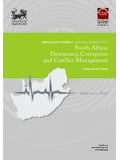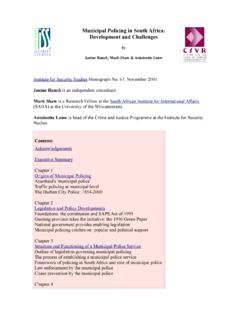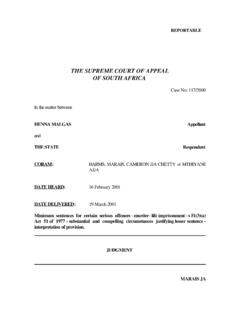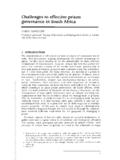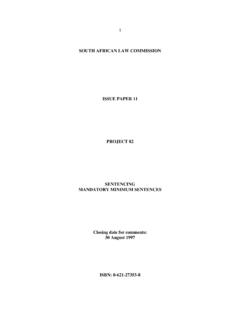Transcription of CORPORATE LAW AND SECURITIES REGULATION …
1 THE FINAL REPORT OF THE COMMISSION OF INQUIRY INTO THE AFFAIRS OF THE MASTERBOND GROUP AND INVESTOR PROTECTION IN south africa CORPORATE LAW AND SECURITIES REGULATION IN south africa THE HONOURABLE MR JUSTICE NEL CAPE TOWN VOLUME 2 APRIL 2001 NEL COMMISSION CONTENTS OF VOLUME 2 CHAPTER 8: SECURITIES REGULATION The Primary Market Disclosure and the Merit Review 316 CHAPTER 9: Disclosure and the Secondary Market 351 CHAPTER 10: REGULATION and Supervision of Intermediaries 366 CHAPTER 11: The Records of Corporations Access by Shareholders 420 CHAPTER 12: Debentures and the Holders of Debentures 453 CHAPTER 13: Financial Statements The Auditor and the Expectation Gap Access to Records by Interest Groups 489 CHAPTER 14: The Fiduciary Duties of Directors 595 CHAPTER 8 SECURITIES REGULATION THE PRIMARY MARKET DISCLOSURE AND THE MERIT REVIEW In England, the REGULATION of SECURITIES was preceded by the REGULATION of markets.
2 The common law offences of engrossing (buying in a quantity of corn etc. to sell again at a high price), forestalling (raising the price of certain goods by holding up supplies etc.) and regrating (buying corn or other grain in any market so as to raise the price, and then selling it again in the same place) were rendered statutory offences in 1363.(1) Investor protection started during the 16th century with bankruptcy laws(2) which sought to protect creditors, followed in the 17th century by laws which attempted to eliminate dishonest brokers(3). In 1720 the 'Bubble Act' outlawed unincorporated joint stock companies (4) and in 1734 trading in futures and options and short sales were prohibited(5). The Joint Stock Companies Act of 1844 required the filing at the Registry Office of prospectuses and documents such as advertisements which were addressed to the public and related to the formation of companies.
3 It also required the filing of annual balance sheets and auditors' reports and prohibited the purchase and sale of shares of the company by its directors except with the consent of the shareholders at a general meeting. Later reforms in SECURITIES REGULATION in the United Kingdom were mainly scandal-driven and except for developments during the last decade which led to the establishment of the Financial Services Authority (the FSA), the United Kingdom could certainly not have served as a model for other jurisdictions. "Almost every significant reform of the law or its administration in Britain has occurred as a direct result of the concern felt after a major scandal which has either dramatically illustrated the incompetence of the existing law or a significant lacuna in REGULATION . Sadly this has meant that experimentation and refinement of the law and regulatory devices have been pragmatic and have generally only been viable when they can be conveniently attached to `the coat-tails of some measure that is justified by public outrage".
4 (6) During the 20th century and after a period in its history when fraud and corruption permeated all levels of society including the presidency, the judiciary, financiers, brokers and the like, the United States of America became the world leader in the field of SECURITIES REGULATION and supervision. Each state has its own SECURITIES law and in addition there are a number of federal laws, such as those which created the present SECURITIES and Exchange Commission (the SEC). During that unfortunate period in its history, the dishonesty which was endemic in the American economy is virtually beyond belief. Fortunes were made and lost in fraudulent and speculative ventures in gold mines, oil wells and railways. The stock market was often manipulated to 'corner' markets and the 'robber barons' ruled supreme.
5 Some of the methods used by the 'robber barons' are described by Edward Chancellor, and serve to illustrate the background to and the necessity for the far-reaching powers of regulators and supervisors which the American legislators bestowed upon State regulators and the SEC. "The promoters of the mining companies harnessed the mood of the day with age-old ploys. First, a claim in some unknown place was purchased for a pittance in cash or a quantity of shares and specimens of ore were submitted to an assay and certificated by a mineralogist. Then, a wealthy and respectable merchant, joined by other notables, was brought onto the board in return for a free distribution of shares. The capital of the company would be inflated to many times its value. For instance, the property of the Titan Ledge and Black Mountain Gold, Silver and Copper Company was bought for a thousand dollars and later capitalised at a million dollars.
6 A broker was hired and advertisements placed in the papers announcing a 'limited' subscription. On street corners, boys were employed to hand out prospectuses with lavish descriptions of the company's prospects. Scouts, known as 'bubble-blowers', were hired to lure the bigger investors. Several companies were brought under the control of the same directors, who used the capital raised for one company to pay the unearned dividends of another.. The great stock operators did not trifle with the transient mining and petroleum bubbles. Their attention was focused almost exclusively on the market for railroad stocks, where manipulation was a fine art and consequently the investment returns more certain. The great aim of the operator was to achieve one of the railroad corners which recurred with unprecedented frequency throughout the period.
7 Among the most notorious corners were those in Harlem (1863 and 1864), Michigan Southern (1863 and 1866), Prairie du Chien (1865), Erie (1866, 1867, and 1868) and Chicago and Northwestern (1867 and 1872). The profits could be enormous : Henry Keep's pool in the Chicago and Northwestern Railroad in 1867 netted over $2 million. These operations were not without danger, as corners could be broken by 'watering' existing stock with new issues or by repatriating stock held in Europe. Therein lay the excitement of the game. A pool operator would start by simulating weakness in a particular stock in order to shake out those holders on small margins and entice others to sell the stock short (this was known as the 'partridge trick'). The pool even lent from its own stockholding to facilitate short sales.
8 Disreputable brokers provided 'wash sales', which set misleading prices. In a market hungry for 'points' or tips, false rumours were rife. Broken speculators, known as 'pointers', 'singed cats', or 'ropers-in', were commissioned to put out specious stories and solicit short sales. False rumours became so common that many acted contrary to what they were advised in the market, a practice known as 'coppering'. Once the stock had been oversold, the operator would catch out the short-sellers and force up the price (this was known as the 'scoop game'). A corrupt press was a useful tool in the hands of a stock manipulator. The notorious operator Jay Gould (of whom more later) controlled several newspaper editors, who in exchange for share tips would print whatever story he told them.
9 After his death, the New York Times remarked: Mr. Gould's editors were known to the public as stool pigeons. It was their function to entice the incautious investor or speculator within reach of his ammunition; to 'hammer' SECURITIES that he wished to acquire, and to exalt by artful misrepresentation the quotations of those he desired to 'unload'. Away from the stock exchange, other ways were found to manipulate SECURITIES . Influence over the board of directors was the most common and effective method, as Daniel Drew had shown with the Erie Railroad. Drew was frequently a bear, even in the stock of his own company, since his ability to issue new Erie shares made it almost impossible for other operators to corner him. 'Railway directors,' wrote James Medbery, 'are the heavy artillery of the stock market, and no corner can attain Napoleonic victory without them'.
10 Directors manipulated dividends to suit their speculative activities (sometimes paying them out of capital), broadcast false rumours (in 1869, the directors of the Pacific Mail circulated stories of an impending dividend increase in order to unload their shares), passed expected dividends, and issued unauthorised stock. Occasionally, speculating directors went even further. When Jim Fisk was a director of the Erie Railroad, he sold short the stock of the United States Express Company, which had a contract with the Erie, and then cancelled the contract. Once the express company's share price had fallen, Fisk covered his shorts, bought more shares, and then reinstated the contract. This technique was refined later in the century by the notorious gambler and speculator John 'Bet-a-Million' Gates, who shut down his Chicago steel plant during a period of prosperity and put thousands out of work, claiming that the business was not making money.










